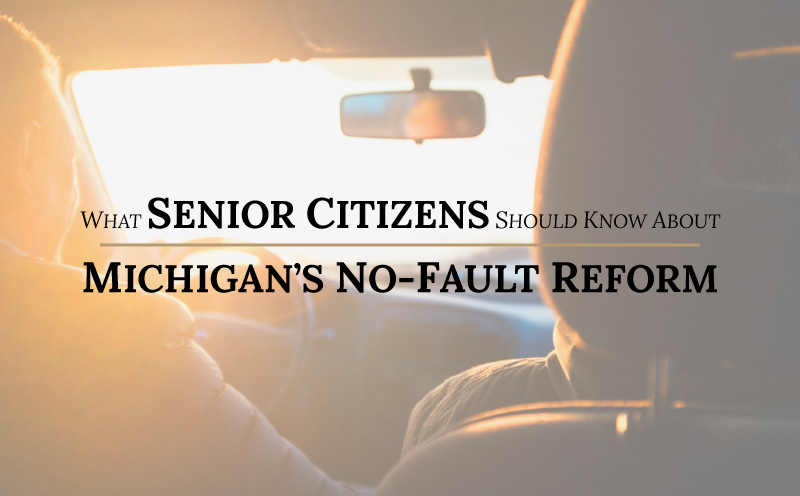The Rights of Senior Citizens Injured in Michigan Auto Accidents

In a recent appearance on WLAJ “In the Name of the Law”, Michigan auto accident attorney Stephen Sinas explains the special issues senior citizens injured in Michigan auto accidents face following the 2019 changes to Michigan No-Fault Insurance Law.
What No-Fault Medical Expense Coverage Do Senior Citizens Have Following a Michigan Auto Accident?
When Michigan auto no-fault law changed in 2019, it had a massive impact on all motorists across the state, and particularly some of those changes to no-fault laws affect senior citizens even more than the average driver. Like all Michigan drivers, under the original no-fault law, senior citizens had to buy no-fault benefits that had lifetime medical expense coverage and there weren’t any monetary caps on that coverage. No-fault benefits are payable regardless of who was at-fault in the crash. This meant that for a senior catastrophically injured in a crash even if they were at-fault for a crash – they were completely covered for any care they needed for the care, recovery, and rehabilitation of their injuries. Under the changes made in 2019, everyone including seniors has the option to reduce that unlimited lifetime medical expense coverage, and cap it at a selected amount. Seniors also have the option of opting out of no-fault medical coverage altogether, and only turn to Medicare when injured. However, it should be noted that the 2019 changes did not change the rule that existed under the original no-fault law which prohibits seniors on Medicare from being able to further discount the cost of their no-fault insurance by buying no-fault insurance that is coordinated with their Medicare coverage. Coordination with Medicare is against federal law, and that remains the case following the 2019 changes.
Why it’s Not Advised for Senior Citizens to Opt-Out of No-Fault Medical Expense Coverage
Under Michigan’s new no-fault law, if you’re a senior citizen with Medicare, you have the option when selecting your auto no-fault policy to opt-out of medical expense coverage. If you make this selection, you will not be covered by your no-fault insurance for any medical expenses if you are injured in a Michigan auto accident. The issue with this selection is that if you’re just relying on Medicare, it won’t cover you should you need long-term care and rehabilitative treatment following a crash. Medicare may cover the immediate medical expenses such as surgeries and other treatments, but there’s typically no coverage if you are seriously injured and need extended post-acute rehabilitation services, long-term home nursing care, services residential rehabilitative accommodations, handicap-accessible accommodations, case management services, guardianship services, etc. One exception to this rule is when senior citizens who opt-out of no-fault medical expense coverage are hit by a car as a pedestrian or bicyclist. In these instances, that person may be able to receive coverage as much as $250,000, from what’s called the Assigned Claims Association.
In the video above, Lansing car accident lawyer Stephen Sinas appears on WLAJ “In the Name of the Law” to explain the rights of senior citizens injured in Michigan auto accidents.
Senior Citizens Rights Against At-Fault Drivers in Michigan Auto-Accidents
For drivers injured in a Michigan auto accident that wasn’t their fault, they do have the ability to file what’s called an auto negligence claim against that at-fault driver for their medical expenses. The damages that can be recovered in an auto negligence case include compensation for the injured person’s pain and suffering and diminished quality of life. Furthermore, for seniors who opt-out of no-fault insurance coverage, the 2019 changes allow them to recover all of their past, present, and future auto-related medical expenses from an at-fault driver. It is important to note, however, there is not an endless amount of money that can be recovered in an auto negligence case. There are typically liability insurance limits that effectively cap the total amount that an injured person can recover in this case.
Moreover, it should also be known, that when Medicare is involved, if you receive a recovery from your auto negligence case, under federal law, Medicare has the right to claim reimbursement for the medical expenses they paid on your behalf. This could result in you receiving far less and possible nothing from the settlement

